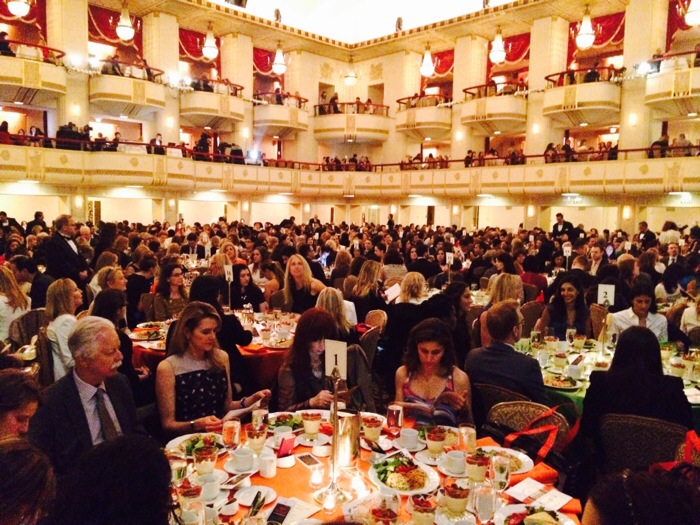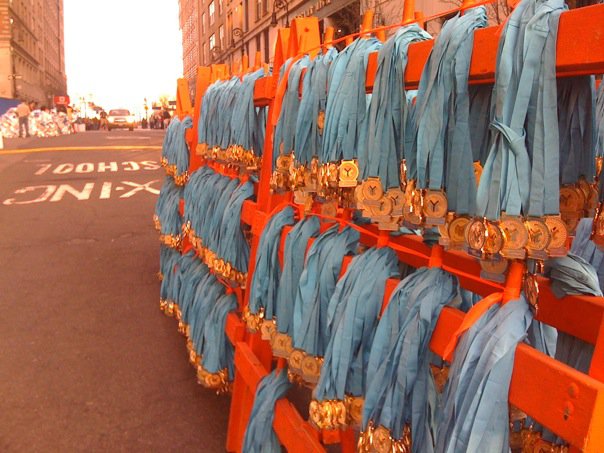About a months ago, I posted about my experience running my first NYC Half Marathon. To sum it up, the most I’d ever run prior to that day was 4 miles (and I can count on three fingers how many times that was). Yet somehow despite all of this I managed to run the 13.1 miles in 2 hours and 11 minutes. The strange part being I did it without stopping and quite easily. Or rather the crazy part considering I’m not a runner.
So now for the big question everyone (and I mean every friend, acquaintance, and person I ever worked or went to school with) has been asking me, how did I do it?
First off, I’ll start with:
- Have a positive attitude and some confidence in yourself. Seriously, if I can do it anyone who is physically able probably can.
- Once you’ve established you’re going to try to run it, don’t constantly complain to your friends who are runners that are trying to help you out about how much you hate running and how you’re never going to make it, how you should have never signed up … On a personal note, Fernando, I would like to take this opportunity to say I’m sorry and thank you so much for putting up with me.
- Check out one of those 10-week half-mile schedules. Google it, you’ll find one for free. It puts together a whole running plan to keep you on track. I’ve heard they’re really excellent (especially for beginners).
- Round up moral support. You have no idea how amazing it feels to be running and all of a sudden see someone you know cheering for you. It’s like instant energy!
I didn’t do any of the above, but I endorse them. I should have been more responsible. The smartest thing I did was to write a post back in January when I first was accepted into the race asking friends and readers for advice. I was fortunate to receive a lot of great feedback, all of which are the answer the original question.
So here it is, what I attribute to my success to:
- Music – My savor, whether it was Pandora or my iPod, I get too bored to run without music. Having something with a beat helped keep me going.
- Pace – Find you’re pace and focus on your breathing (try to make it consistent).
- Do not push yourself – and this isn’t just for the day of the race. When training it’s not about how fast you go, it’s about how long you can go for to build up your endurance (especially in the beginning).
- Join a runners group (thank you North Brooklyn Runners Group) – This is not for everyone. Especially if you feel like you’re pushing yourself to be at a level that you’re not. Plus talking while running made me winded. However, it’s great for motivating yourself to get out and run and also a great opportunity to get advice from your peers.
- Do not curl your toes – Not that most normal people do this, but for some reason I used to and it landed me a foot cramp that lasted for days.
- Diet –I heard everything from stop drinking, to getting certain vitamin supplements to all around eating healthier. I didn’t really change my diet or go out habits, however I did the classic big pasta dinner before the race and the day of woke up 2 hours before and had peanut butter on rice cakes. Worked great for me!
- Be balanced! – This is really important. I was running with a friend and after an embarrassingly short distance I began to cramp on one of my sides. He told me to take everything out of my pocket. It was only my knit hat. As it turned out physiologically, even though the hat barely weighed anything my body was trying to overcompensate for the imbalance of it being on one side and was causing me to run off center, and thus begin cramping.
- Keep in mind a lot of this is mental – The morning of the race I was riding the subway and upon hearing this was my first race (and hardly trained) one marathon patron went on about how a lot of this was mental and to stay focused. I thought about that a lot and wondered how many times I stopped running because I was truly tired vs. just bored. Or how if I was really amped up about something I could go miles with no problem but if I was in a bad mood, I was done after one. I think there’s a lot of truth to this, just some food for thought.
- Don’t stop – this is a personal preference, but I knew that if I stopped and tried to walk, I would not have been able to finish. Slowing down is fine, but don’t stop.
- Get inspired! – There’s tons of inspiration around you, strangers cheering you on, people running for causes, it’s really very touching. My race consisted of running through the entire track of Central Park and being able to run in the middle of the street (legally) through Times Square. I really took it all in and appreciated my surrounding– that helped.
- Get a timer! – If I had any perception of time I would have pushed myself a little harder for an even better time (I thought I was pitter-pattering my way through it and that my time was closer to 3 hours than 2). In fact at one point some older Italian man tapped me on the shoulder and asked if I could take his picture. So I ran in place while he backtracked and then ran towards me for the shot (that’s how seriously I took it). Not that I regret the time I spent on that, he was so grateful and excited. My point is had I even noted my starting time, especially on those finale miles when I knew I was finished the race I could have pushed myself in the end.
- MOST IMPORTANTLY, RUN ON TIRED LEGS!! – I saved the best for last. This bit of advice probably carries the key on how I ran the half marathon. About two weeks before the race I was advised to run on tired legs. Basically I needed to run or walk for at least an hour every night and then wake up early the next morning and do the same thing. Considering I was so out of shape, that translated to running about 1-1.5 miles every evening (or walking at least 30 minutes) and then waking up (not so early) and doing the same thing. After a week, I called the advice giver asking for some clarification, ‘does tired legs mean sore legs?’ The answer way yes, but not to a degree that your legs hurt. By doing this method of running, I was training my legs to learn how to run when they got tired, which is basically what you’re signing up for when running any type of marathon.
The only other thing I will add having gone through all of this is to take it seriously but have fun with it. If this is something you’ve always wanted to do, but were concerned you had to change you lifestyle too much or are just too scared, you should sign up. You’ll find a way to make it work for you. I really deprived myself of a lot by not having any confidence in myself (even if it somewhat justified – I should have trained). I missed out on sharing the experience with a lot of loved ones who wanted to support me as well as really finding out what I was made of. Even so, I’m too grateful for having had the great experience that I did to really dwell on any of my shortcomings. I did it and it really was one of the best experiences of my life.
Thank you to everyone who read, emailed, called, and gave me advice. I could not have done this without you.

















